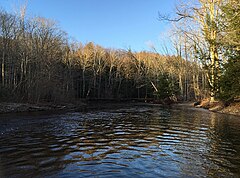Salmon River (Connecticut)
 From Wikipedia the free encyclopedia
From Wikipedia the free encyclopedia
| Salmon River | |
|---|---|
 Looking downstream on the Salmon River immediately after the confluence of the Jeremy and Blackledge Rivers. | |
| Location | |
| Country | United States |
| State | Connecticut |
| Cities | Colchester, East Hampton, East Haddam, Haddam |
| Physical characteristics | |
| Source confluence | confluence of Blackledge River and Jeremy River |
| • location | Colchester, New London County, Connecticut |
| Mouth | confluence with Connecticut River |
• location | East Haddam & Haddam, Middlesex County |
| Length | 10.4 mi (16.7 km) |
| Basin size | 150 sq mi (390 km2) |
| Basin features | |
| Tributaries | |
| • left | Day Pond Brook, Moodus River |
| • right | Dickinson Creek, Flat Brook, Safstrom Brook, Elbow Brook, Pine Brook |
The Salmon River is formed at the confluence of the Blackledge and Jeremy rivers about one mile west of North Westchester, Connecticut. It drains 96,000 acres[1] and courses for 10.4 miles (16.7 km)[2] to Salmon Cove near Moodus where it flows into the Connecticut River. The Salmon River is probably the largest stream and watershed whose sources and mouth are entirely within the limits of Connecticut.[3]
There is a popular paddling route along the Salmon River varying in difficulty from quickwater to Class II whitewater. It begins along River Road about 1/10 of a mile south of the river's formation and continues for about 7 miles to the flatwater of Salmon Cove.
The Salmon River's substantial drop in elevation over its course provided considerable water power to the textile mills in Moodus during the 19th and early 20th centuries.
Conservation[edit]
Beginning in the early 20th century, significant efforts have been invested on the federal, state and local levels towards conserving both the Salmon River corridor itself and the broader territory encompassed by its watershed.
The Salmon River Division of the Silvio O. Conte National Wildlife Refuge encompasses 425 acres of freshwater tidal marshes, riparian meadows, cold-water tributary streams, floodplain forests, mixed hardwood forest, hemlock stands and vernal pools along the lower stretches of the river near its confluence with the Connecticut.[4]
Connecticut's State Board of Fisheries and Game established the Salmon River State Forest in 1934. Subsequent acquisitions by the state have enlarged the forest to its present size of roughly 6,000 acres throughout Hebron, Marlborough, Colchester, East Haddam and East Hampton.[3] The 300-acre Machimoodus State Park in East Haddam,[5] 180-acre Day Pond State Park in Colchester[6][7] and the 465-acre Wopowaug Wildlife Management Area in East Hampton and Haddam[8] further contribute to the state's role in conserving the natural habitats and rural character of the Salmon River watershed.
Land trusts hold numerous, smaller nature preserves and conservation easements throughout the Salmon River basin such as Pine Brook Preserve in Haddam,[9] Keech Preserve and Salmon Cove Preserve in East Haddam[10] and the Gateway Property and Palakewitz Easement in Colchester.[11]
See also[edit]
References[edit]
- ^ "Why Protect the Watershed". Salmon River Watershed Partnership. Salmon River Watershed Partnership. Retrieved 30 January 2016.
- ^ U.S. Geological Survey. National Hydrography Dataset high-resolution flowline data. The National Map, accessed April 1, 2011
- ^ a b "Salmon River State Forest". State Parks and Forests. Connecticut Department of Energy and Environmental Protection. Retrieved July 24, 2014.
- ^ "Silvio O. Conte National Fish & Wildlife Refuge: Connecticut". U. S. Fish and Wildlife Service. U. S. Fish and Wildlife Service. Retrieved 29 January 2016.
- ^ "Machimoodus State Park: East Haddam". Connecticut Department of Energy & Environmental Protection. State of Connecticut. Retrieved 29 January 2016.
- ^ "Day Pond State Park: Colchester". Connecticut Department of Energy & Environmental Protection. State of Connecticut. Retrieved 29 January 2016.
- ^ "Day Pond State Park, Colchester, Connecticut" (PDF). Connecticut Department of Energy & Environmental Protection. State of Connecticut. Retrieved 29 January 2016.
- ^ "Wopowog WMA" (PDF). Connecticut Department of Energy & Environmental Protection. State of Connecticut. Retrieved 30 January 2016.
- ^ Marteka, Peter (22 February 2009). "Land Trust's Pine Brook Preserve Can Be Like A Fairy Land". Hartford Courant. Retrieved 30 January 2016.
- ^ "East Haddam Land Trust Easements and Properties without Trails". East Haddam Land Trust. East Haddam Land Trust. Retrieved 30 January 2016.
- ^ "Colchester Land Trust Acquisitions". Colchester Land Trust. Colchester Land Trust. Retrieved 30 January 2016.
External links[edit]
- Connecticut Explorer's Guide Online paddling map of the Salmon River